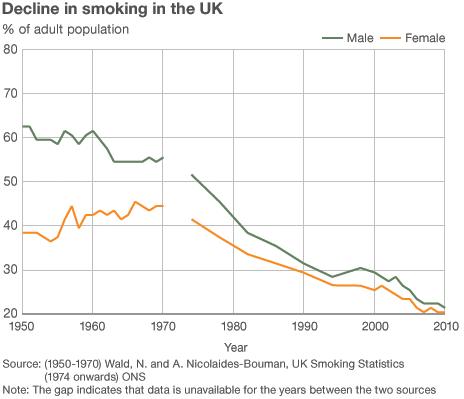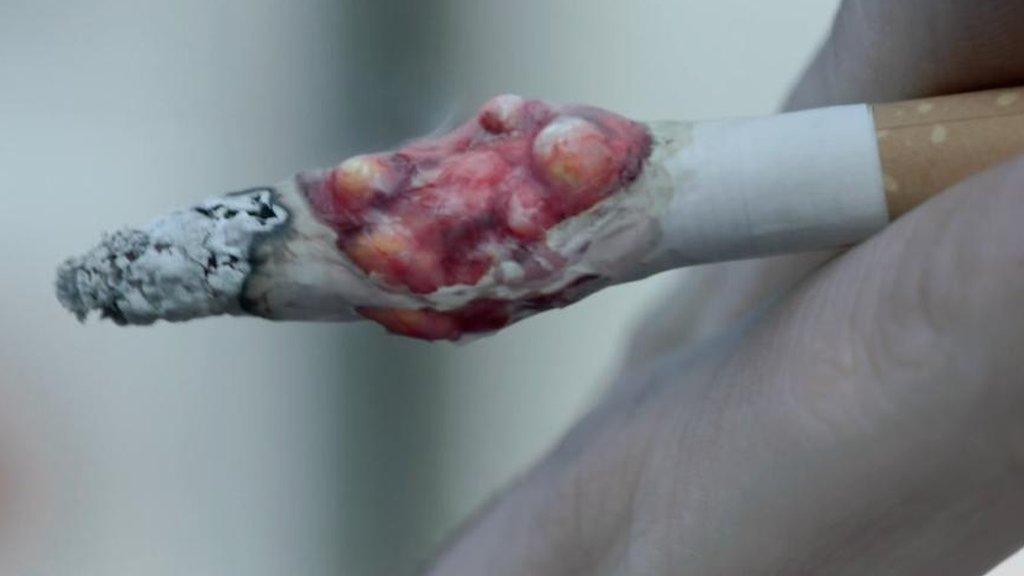Smoking: Can the nation kick the habit?
- Published
- comments

Smoking rates are hovering just above 20%
Ever since the link between smoking and lung cancer was established beyond doubt in the 1950s, there has been a push to persuade people to quit.
Within a decade, smoking adverts had been banned on TV, while doctors were advising their patients to stop smoking for the good of their health.
Health clinics to encourage people to give up soon started being opened and smoking rates started dropping dramatically.
Sixty years ago 60% of men and nearly half of women smoked. By the end of the 1980s the figures had dropped to below a third in the UK.
The downward trend continued right into the 21st Century - but in the past five years it has slowed, stubbornly hovering just above one in five.
Undeterred, the government is launching a hard-hitting media campaign to get people to make the most of those new year resolutions to quit smoking.
But the struggle to reduce smoking below the magical 20% barrier raises an interesting question: is there now a hardcore group of smokers who just won't or can't quit?
Momentum
There are mixed views about this among experts.
On the one hand, the number of young people taking up smoking is falling, which means the overall numbers are largely being sustained by longer term smokers who are not giving up.
But, of course, with smoking being the leading cause of preventable and early death - half of smokers will have their lives curtailed by the habit - there are many who believe the recent struggles mean there just needs to be redoubling of the effort.
Martin Dockrell, director of policy and research at the campaign group Action on Smoking and Health, says one of the biggest influences on quitting smoking is having role models and peer groups that are also giving up.

"It has been shown that if your partner quits, you are twice as likely to quit yourself. The same thing happens with a community. If others are quitting, momentum develops and you get a tipping point.
"It happened with doctors in the 1960s, they all started to quit together.
"And while the figures haven't dropped as much as we would like in recent years, one of the regions that has done the best is the north east [of England]. Again we saw that community effect."
The government seems to have accepted this too, as the idea of quitting together was part of the thinking behind creating Stoptober, the social quitting event held in October.
So will the numbers drop even more?
The Department of Health hopes so. It has set a "national ambition" in England to get smoking rates down to 18.5% by 2015 with ministers talking about the need to "denormalise" it.
To achieve this the government is putting the squeeze on smokers through ever tougher regulation such as the ban on tobacco displays (which is being rolled out) and the introduction of plain packaging (which is being considered).
Prof Robert West, the director of tobacco studies at University College London, is cautiously optimistic such measures will have an impact.
"It does get harder when you are down to a smaller number of smokers, but the research shows that about 70% of smokers still want to give up.
"We just have to keep going. People are still giving up and steps such as the display ban and plain packaging - if it happens - stop the industry making smoking attractive."
- Published28 December 2012

- Published9 March 2011
- Published24 November 2011